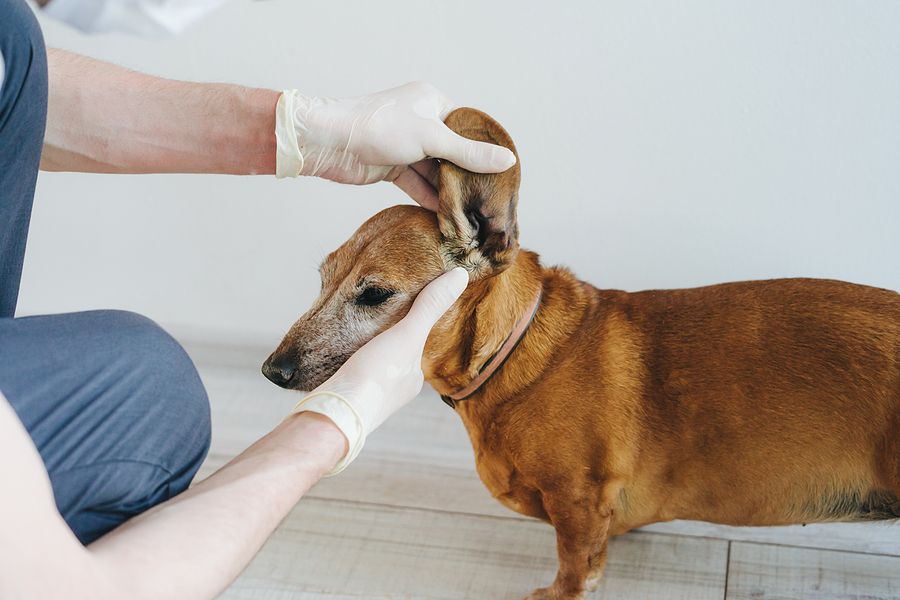The 5 Most Common Genetic Disorders in Dogs
As much as dog lovers can strive to prevent illness in their favorite canine companions through proper preventative care for dogs, DNA plays a role in their pup's health regardless of upbringing.

Genetic disorders in dogs are commonly found in purebred and mixed-breed dogs. Some genetic disorders in dogs are discoverable through DNA testing as a precautionary option.
With the wide variety of disorders in canines, it's essential to understand the most common genetic disorders in dogs.
1. Hip Dysplasia
Hip problems in dogs are one of the most common genetic disorders, with overbreeding being the leading cause. Though commonly found in larger breeds such as German Shepherds, Rottweilers, Bulldogs, Great Danes, Saint Bernard's, Neapolitan Mastiffs, and Retrievers, hip issues can contribute to small dog joint problems as well.
Early detection and maintaining a healthy weight are among the most valuable ways to reduce clinical signs of hip dysplasia.
2. Brachycephalic Syndrome
Brachycephalic means "short-headed," as this genetic disorder is often purposefully bred into dogs to produce the increasingly popular "smushed-face" appearance. Examples include the Pug, English and French Bulldog, and Boston Terrier.
Though appealing to owners, the physical characteristics of BS come with some serious (and harmful) effects. The anatomical abnormalities causing their short face can lead to severe respiratory difficulty, dental issues, vision defects, and skin problems.
If you are considering a breed with this predisposed disorder, be cautious of exposure to intense weather, temperatures, and excessive exercising. Start regimented visits with your vet from a young age to get on top of these abnormalities which can sometimes be corrected through surgery.
3. Heart Disease
Many breeds have an inherited risk of dilated cardiomyopathy, with Cavalier King Charles Spaniels, Dachshunds, Doberman Pinscher, and Great Danes leading the pack.
This genetic disorder in dogs causes weakened heart musculature leading to a reduced dilated heart. In addition, some breeds (Boxers and Bulldogs) can also develop arrhythmogenic right ventricular cardiomyopathy — where fatty/fibrous tissue replaces normal heart cells.
Dogs who suffer from heart disorders can endure fainting, heart failure, and possible sudden death. The best way to prevent this is by screening often. However, medications can treat the disorder, so be prepared to talk to your vet about your options.
4. Epilepsy
One of the more difficult genetic disorders in dogs to identify, is Epilepsy, commonly found in Golden and Labrador Retrievers, Beagles, Dachshunds, and German Shepherds.
Epilepsy can be defined as reoccurring seizures that regularly afflict a canine. This event can be traumatic for dog owners to experience witnessing their pooch stiffen, fall to the ground, drool, paddle their legs, or even lose control of their bladder, with little they can do to ease the seizure.
As with most genetic disorders in dogs, there is no cure for Epilepsy, but with the correct combination of medications, the frequency of the seizures can be reduced, making the disorder less severe for the dog and manageable for pet owners.
5. Degenerative Myelopathy
This genetic disorder in dogs occurs when there is a failure of nerve signal transmission within the mid-to-lower spinal cord — beginning in the hind legs with weakness, dragging of the hind feet, and immobility. This disorder eventually results in paralysis.
Many breeds are susceptible to this genetic disorder such as the Corgi, American Water Spaniel, Bernese Mountain Dog, Chesapeake Bay Retriever, Boxer, Pug, and German Shepherds.
There is no medical treatment for DM, but those with severe symptoms can be helped by using a harness or cart. This disorder is not painful to the canine. However, they can develop incontinence issues and require extra attentiveness from the owner to ensure their quality of life.
These are just a few common genetic disorders in dogs and are found in many breeds, as the list is endless.
If you are interested in purebred canines and want to prevent possible genetic disorders, always be sure to evaluate your potential breeder. Ask questions! Take time to research the breed and its links to certain genetic disorders.
Here at Forever Vets Animal Hospital in Florida, we are dedicated to your pet's well-being. Serving the Jacksonville area, St. Augustine, St. Johns, Nocatee, and Orlando regions, we provide a mixture of exceptional customer service and top-notch animal hospital care. If you have any concerns about your pet, call today!


